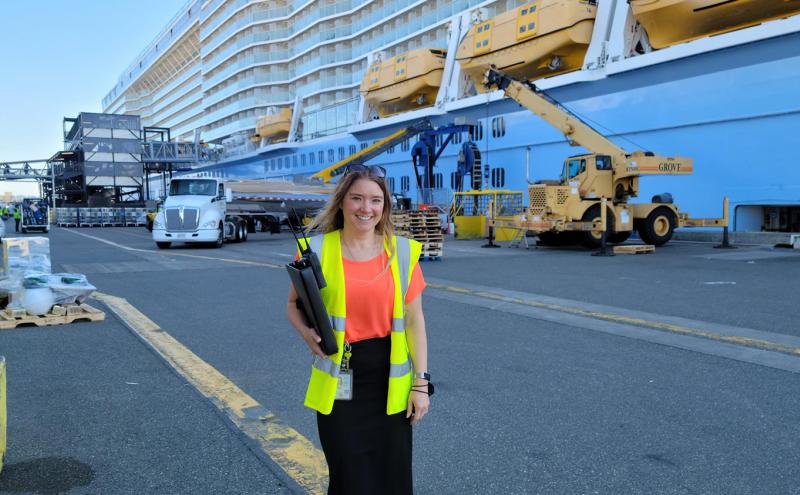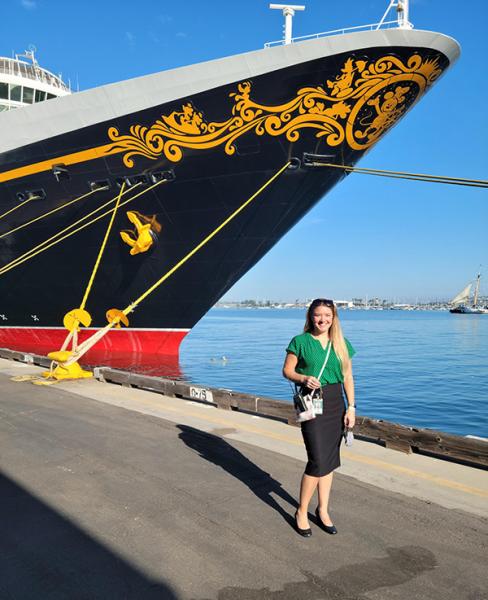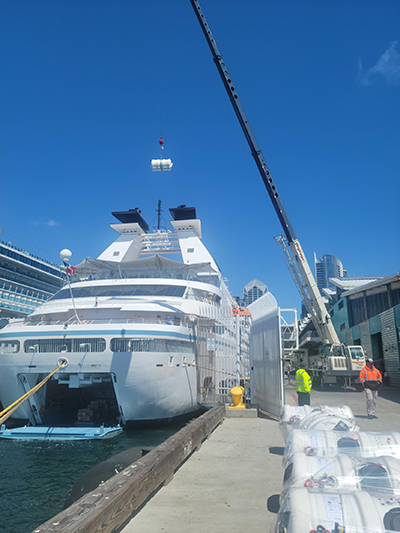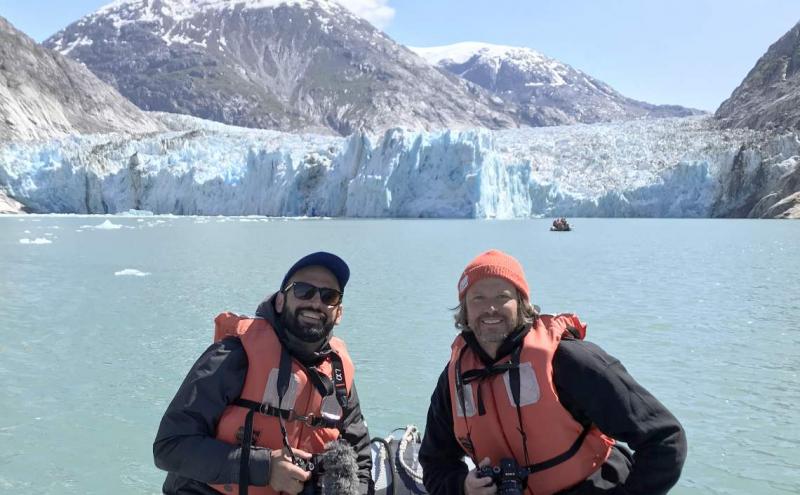
A port agent might be the most fascinating job you’ve never heard of. And for Kate Anderson, it’s a labor of love.
“You work 14-hour days, you are on your feet all the time solving problems, and never really know what will come up next, but I love it,” Anderson said.
Every cruise line coming into port hires a port agent to be onsite when their ships are in port to help prepare for arrival and departure. Port agents serve as liaisons between the ship and shore, coordinating services for the ship and crew. Agents work with the ports to gather information for new vessels, confirm ship call dates, and set up berthing, fueling, provisioning, crew hotel and transfers and other services that may be needed.
Anderson, Director of Port Agency, West and Gulf Coast for Intercruises Shoreside & Port Services, has worked as a port agent based in Seattle for the past 17 years. She instantly fell in love with the often chaotic — but always exciting — work.
instantly fell in love with the often chaotic — but always exciting — work.
“It is definitely an interesting position. No two days are the same. You know a cruise ship will come in, a ship will leave, and in the middle of that, nothing is predictable.”
Over the years, Anderson has worked as a port agent for both cruise ships and cargo ships. The human element of cruise ships, with up to 8,000 people in the mix, adds another layer of complexity.
“One hundred percent of the time there is something they need from you,” she said.
When Anderson was hired as the Manager of Anchor Cruise Agencies, the company started out supporting cruise ships in Seattle, but have since expanded operations to Texas, California, Hawaii, New Orleans, and Vancouver, B.C. Today, she leads a team of seven year-round agents and two seasonal agents.
Although a single agent manages all onshore needs for a particular ship, her team collaborates to make sure nothing gets missed.
Generalists wanted
Anderson’s work begins when a cruise line wants to bring a ship into port. The checklist of tasks required at every port is extensive and important and demands problem solving daily. During the summer season in Seattle port agents can receive over 1,000 emails a day.
“I had a boss who used to say that we’re a jack of all trades and master of none,” Anderson said. “We arrange all the services and make sure everyone does what they are supposed to be doing, but we don’t physically do the work, like piloting the ship, offloading luggage, or providing guest transfers. Someone might come up to me with an item in hand and say 'we need 200 of these today before we sail'. My first question is usually ‘What are these?’ We’re trying to figure these things out like a puzzle.”
To succeed, agents must have a broad range of knowledge, including Customs and Border Patrol (CBP) regulations, Coast Guard rules, security requirements, environmental regulations like emissions restrictions, noise restrictions, hull cleaning restrictions, shore power logistics and requirements, plus federal, state, and port-specific regulations.
From the time the agent learns of a ship’s scheduled arrival until the ship is underway, the agent handles various operational needs like arranging the berth at the port, reserving the terminal, gangway arrangements and ensuring security is in place. They coordinate to make sure fuel barges arrive, secure labor to offload and onload provisions, and coordinate delivery trucks. When ships cross international borders, Anderson works with Customs and Border Patrol (CBP) to schedule inspections for guests and crew. Her team also facilitates crew changes, sets up transportation for the crew, and schedules purchases, medical appointments, and other services needed by crew or guests.
On the day the ship arrives in port, the agent is the first to cross the gangway and works with CBP and Ground Operations to screen departing guests and crew. It takes a lot of coordination and long days as ships arrive at around 6:00 a.m. and leave by 4:00 p.m. The agent is on site all day to oversee everything.
Expecting the unexpected
 “My favorite thing is watching the ship arrive in the morning, wondering what new things will come up that day” Anderson said. “You never really know what will happen once you get on board. Somehow you make it through all the crazy of the day, and the ship departs the pier and on to their next adventure.”
“My favorite thing is watching the ship arrive in the morning, wondering what new things will come up that day” Anderson said. “You never really know what will happen once you get on board. Somehow you make it through all the crazy of the day, and the ship departs the pier and on to their next adventure.”
Agents continue to support any ongoing needs after a ship has departed, whether connecting a late arriving crew to the ship, or coordinating delivery of missing items to be received in the ship’s next port.
Spring and summer are the busiest seasons with Seattle and Vancouver ports, seeing seven and nine ships per week. But agents are busy year round serving operations in warmer climates like Los Angeles and Hawaii.
Anderson thought 2019 was the busiest and most challenging year she’d experienced in the cruise industry until the pandemic hit in 2020.
During COVID-19, as cruises around the world were canceled, port agents worked with cruise lines, embassies, and local health officers to get crew members home. This required chartering flights for crew and coordinating with other cruise lines and nearby ships to get crew members on the chartered flight. As the cruise industry slowly returned, essential health and safety protocols have added another layer of complexity to Anderson’s role.
Economic impact
In 2022, Anderson has seen a robust return to cruise, with many people booking cruises after holding off the last couple years.
As the cruise industry bounces back in Seattle, it boosts the economy and supports local jobs in our region, like Anderson’s team of port agents. In the 2022 Seattle cruise season, 1.2 million cruise passengers will depart from Seattle, providing nearly $900 million in economic benefits supporting 5,500 jobs. Cruise ships boost the economy through onboard and corporate office jobs and dollars spent at restaurants, hotels, and local attractions. And even provisioning home port vessels with local goods like wine, produce, dairy products, seafood, flowers, and even services like piano tuning.










